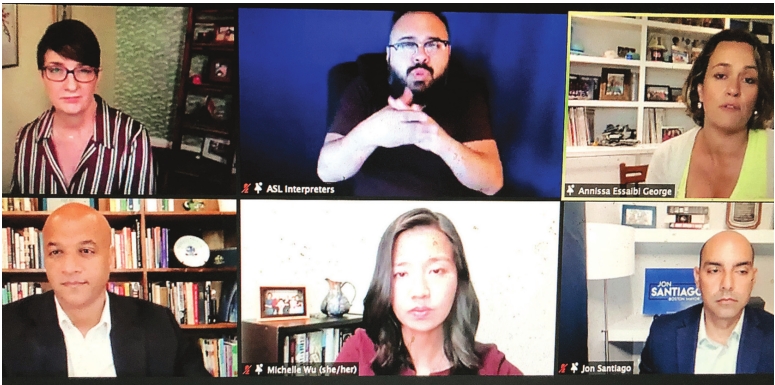
Boston mayoral candidates jockeyed to stand out during a June 14 forum on Pride Month, with views diverging on the role of the police during pride events and some candidates offering more specific policy commitments than others.
All were supportive of the LGBTQ community, but controversy around alleged discrimination by Boston’s Pride leadership and the expectation that Boston’s Pride events will soon follow New York’s example in banning police which gave candidates the opportunity to differentiate themselves.
City Councilor Michelle Wu expressed strong skepticism of the need for police at Pride events, noting a police overtime budget “that keeps increasing by tremendous amounts” and, according to her, takes money way from more holistic approaches.
“It’s important to lift up the legacy that policing and the LGBTQ community has experience over decades, even in Boston.
What happened at the Straight Pride Parade really broke trust,” she said.
“There’s a call not to have armed law enforcement present. There needs to be demilitarization, and we need accountability.”
Wu
highlighted her plan to address the police union contract, which has
been expired for a year. She intends to revamp police discipline
proceedings, shrink overtime and move activities like traffic regulation
and nonviolent calls from the department’s purview.
City Councilor Annissa Essaibi George said that police would always be present at large events, Pride included.
“It’s
important that we’re always looking to limit the involvement of police,
but to say, ‘Oh right, the police won’t be participating, won’t be
playing some limited role in a large-scale event in the city of Boston’
is disingenuous,” she said.
Boston
Chief of Economic Development John Barros said that police were
unnecessary at Pride events, which could instead rely on members of the
community to provide security.
“History
shows that communities can police themselves. It’s a good way to do it,
it works, there’s no reason that the Pride parade here in Boston
couldn’t have marshals,” he said. “We did it in the Black Lives Matter
marches. Police recognized their presence was inflammatory and called in
community members.”
Barros’
specificity in policy proposals often set him apart. When asked about
the loss of LGBTQ spaces, he suggested several policies that could give
minority entrepreneurship a boost.
“We
need to be intentional if we’re going to create these spaces,” he said.
“I would create a fund. Capital is typically one of the biggest
barriers. I would partner it with a technical assistance fund to help
people create business plans. It’s work I’ve done as chief of economic
development.”
When it came to calls to for a general boycott of Boston Pride, however, the candidates were in unison.
While
they agreed that Boston’s organization has problems with corporate
cooption, a lack of minority representation in leadership and an
unwillingness to embrace Black Lives Matter, the candidates said their
status as public figures made their participation in the Pride forum a
necessity.
“We’re here
to start a conversation,” said emergency medicine doctor Jon Santiago.
“Obviously there have been issues within Boston Pride. I’m here to
elevate certain issues that are important to the BIPOC community. We’re
here to hold ourselves accountable and to hold Pride accountable.”